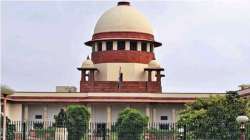SC dismisses plea of Loop Telecom seeking refund of licence fee, damages
The verdict stated that Loop mobile was the beneficiary of the first-come-first-serve (FCFS) policy “which was intended to favour a group of private bidding associates at the cost of the public exchequer”.

The Supreme Court Thursday dismissed a plea of Loop Telecom seeking refund of Rs 1,454 crore paid for 2G licence and damages for loss of reputation after its cancellation, saying the acquittal of promoters in the criminal case did not “obliterate” its findings that the process of granting licence was “arbitrary and constitutionally infirm”.
Dismissing the plea, a bench comprising Justices D Y Chandrachud and Vikram Nath said the acquittal of the promoters of the company in the criminal case did not “efface or obliterate the findings” of the apex court in its 2012 judgement, cancelling the grant of 2G spectrum licences, on the PILs including the one filed by NGO CPIL (Centre for Public Interest Litigation).
“The acquittal of the prompters of the appellant on the criminal charges does not efface or obliterate the findings which were contained in the final judgement of this court in CPIL and hence as a beneficiary of the fraud the appellant cannot take the assistance of this court for obtaining the refund of the entry fee,” said Justice Chandrachud, reading the operative portion of the verdict.
The verdict stated that Loop mobile was the beneficiary of the first-come-first-serve (FCFS) policy “which was intended to favour a group of private bidding associates at the cost of the public exchequer”.
“The contention of the appellant (Loop mobile) that it was exculpated from any wrongdoing by the judgement of this court in the CPIL is patently erroneous. The process leading up to the award of the UAS Licences in granting 2G licences was found to be arbitrary and constitutionally infirm (by this court),” the verdict said.
The need for open and transparent bidding process for the allocation of natural resources was substituted by a process which was designed to confirm lawful benefit to selected bidder by which the appellant firm benefited, it said.
The judgement said that the appellant firm has tried to obviate the findings of the apex court by relying on its acquittal by the special judge, CBI.
“It is important to note that the criminal trial before the special judge CBI was limited to the extent whether the promoters of the appellant had cheated the DoT by providing false representation of compliance of clause 8 of the
UASL guidelines since it was allegedly controlled by Essar group.
“The special judge CBI acquitted the promoters of the appellant because the prosecution was unable to prove that the officer of the DoT considered the representation of the appellant to be false..,” it said, adding that the acquittal in a criminal case did not “efface or obliterate the findings” of the apex court.
The verdict said that the proceedings initiated before the TDSAT, seeking refund of the entry fees, was clearly “in the teeth of the judgement of this court in the CPIL”. “For above reasons, we have come to the conclusion that there is no merit in the appeal and the appeals are accordingly dismissed,” the bench said.
Loop Telecom Limited, in its plea, had sought a direction to the Department of Telecom (DoT) to refund Rs 1,454.94 crores paid by it as licence fee for the grant of Unified Access Licences (UAS) in 21 service areas.
Its 21 licences were among the 122 licences quashed by the Supreme Court in 2012 on a batch of pleas including that of CPIL alleging corruption.
In its petition, Loop Telecom has submitted that the Supreme Court has cancelled the UASL licence issued to it by the government under its ‘flip flop' FCFS policy and it had to suffer a huge loss.
“The reason for quashing the first-come-first-serve policy, the UASLs and the subsequent allocation of the spectrum are wholly and absolutely attributable to the acts and omissions of the respondent (DoT & TRAI) and as a direct proximate result thereof, the petitioner has suffered huge losses and damages,” the plea had said.
The firm had said due to, “faulty issuance of licence and the policy flip-flops of the government, Loop has had to pay a heavy price” and requested for “compensation of Rs 1,000 crore for loss of reputation” along with 12 per cent interest.
Special CBI Judge O P Saini, on December 21, 2017, had acquitted all accused, including former telecom minister A Raja and DMK MP Kanimozhi, in the 2G spectrum allocation scam cases.
The special judge had delivered judgements in separate cases lodged by the CBI and the ED in the infamous 2G spectrum allocation scam. Fifteen other accused in the case and three firms were also acquitted.
Saini had also acquitted Loop Telecom Promoters IP Khaitan and Kiran Khaitan in the case. The others acquitted were Vikash Saraf, one of the Essar Group Directors, Loop Telecom Ltd, Loop Mobile (India) Ltd and Essar Teleholdings Ltd.
The appeals of the CBI and the ED against the verdicts are pending adjudication in the Delhi High Court.